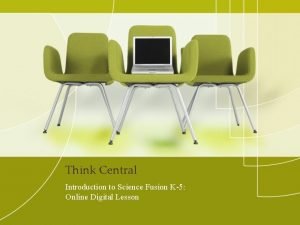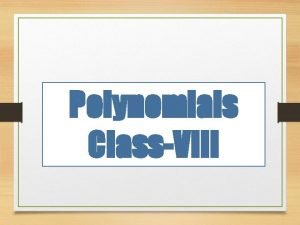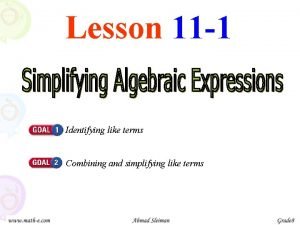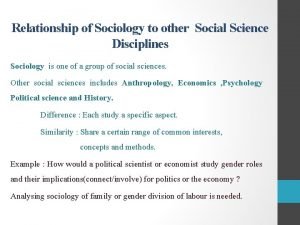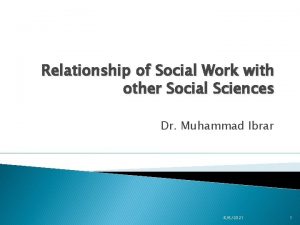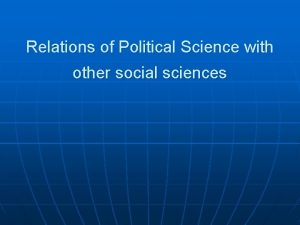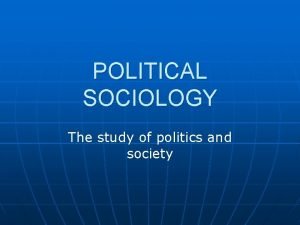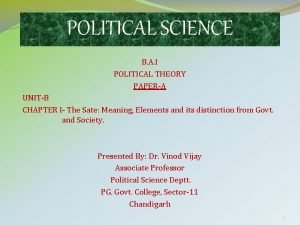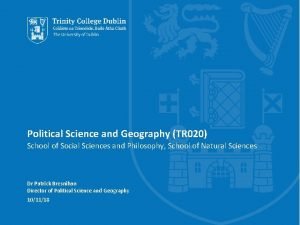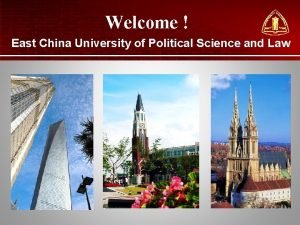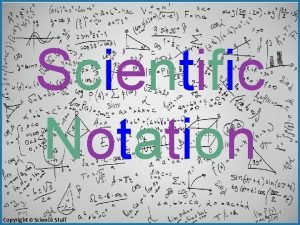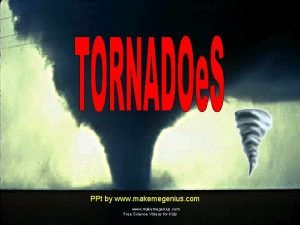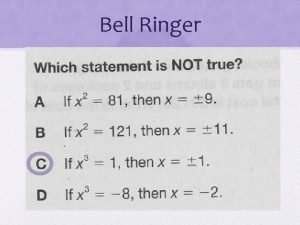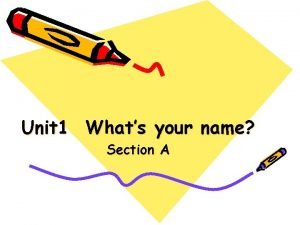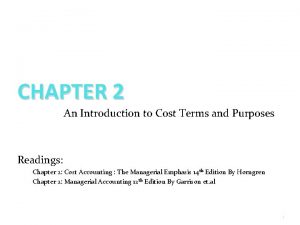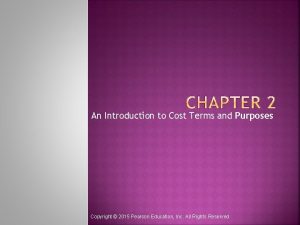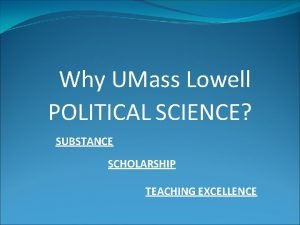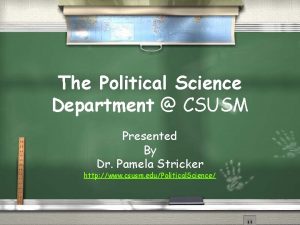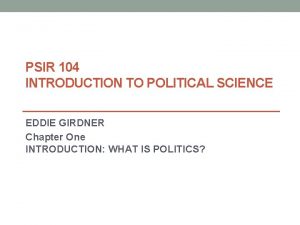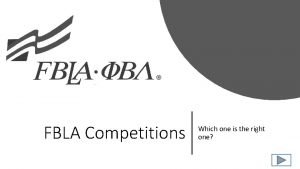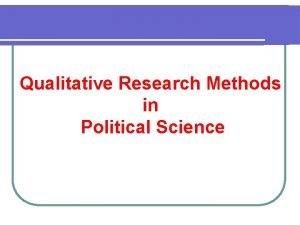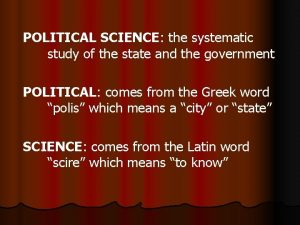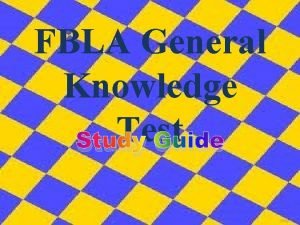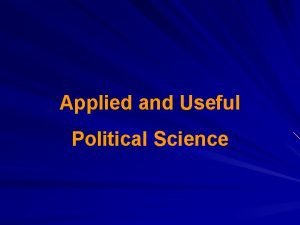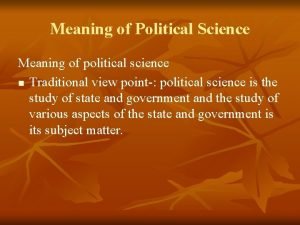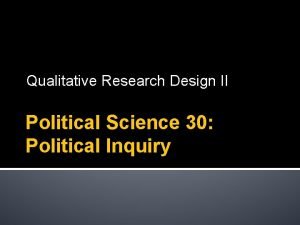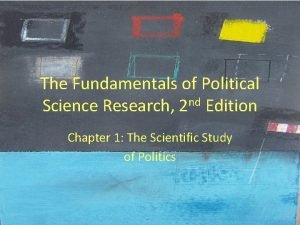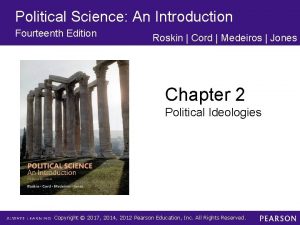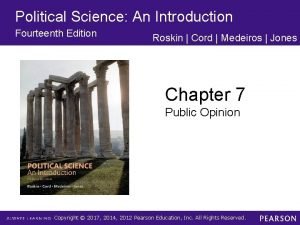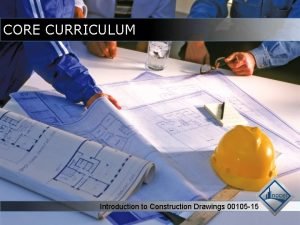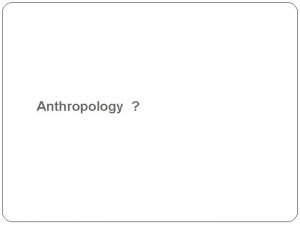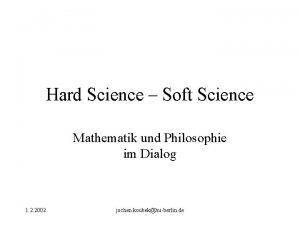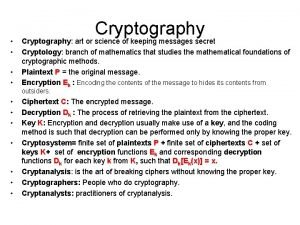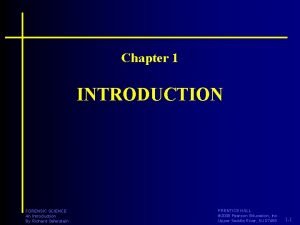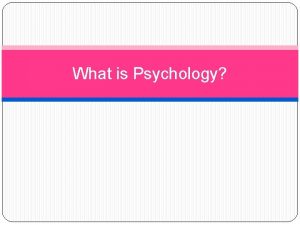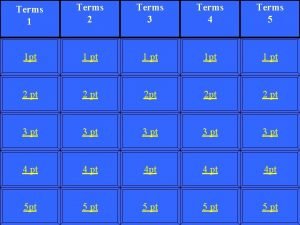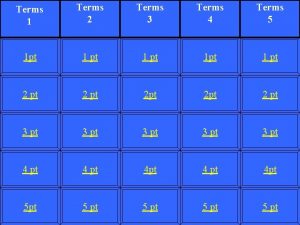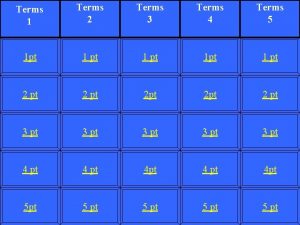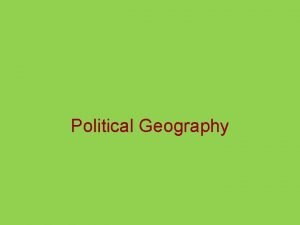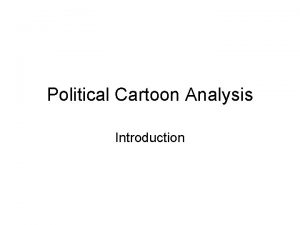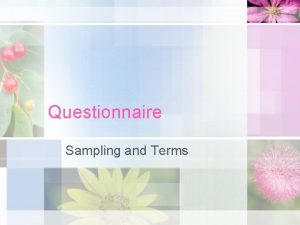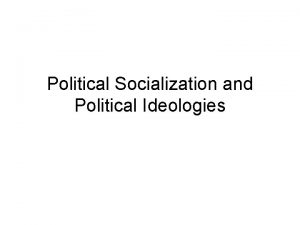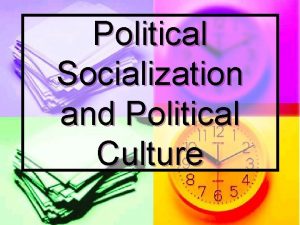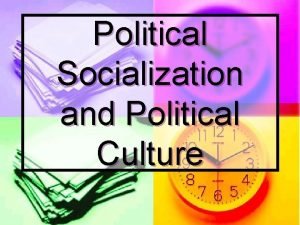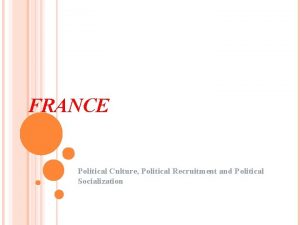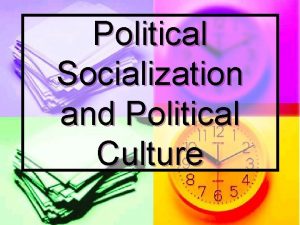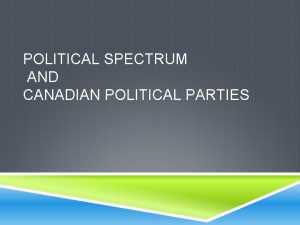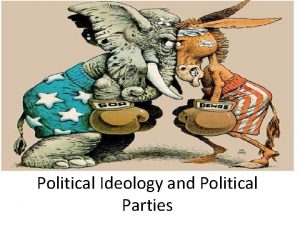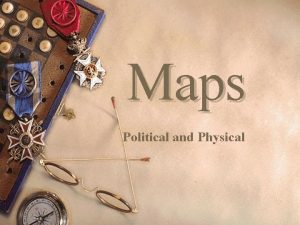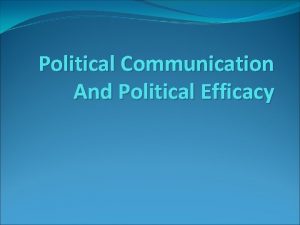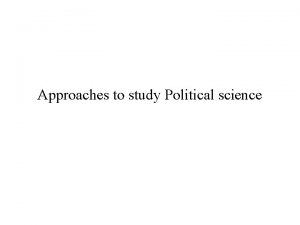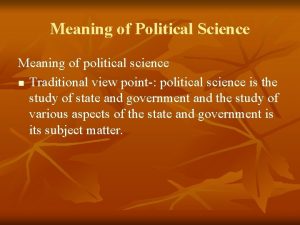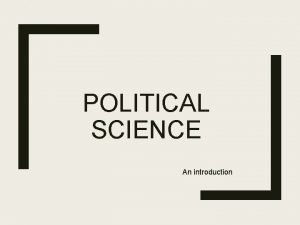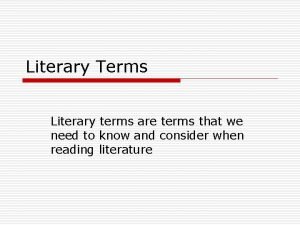Introduction to Political Science I Copyright and Terms





































- Slides: 37

Introduction to Political Science I

Copyright and Terms of Service Copyright © Texas Education Agency, 2011. These materials are copyrighted © and trademarked ™ as the property of the Texas Education Agency (TEA) and may not be reproduced without the express written permission of TEA, except under the following conditions: 1) Texas public school districts, charter schools, and Education Service Centers may reproduce and use copies of the Materials and Related Materials for the districts’ and schools’ educational use without obtaining permission from TEA. 2) Residents of the state of Texas may reproduce and use copies of the Materials and Related Materials for individual personal use only, without obtaining written permission of TEA. 3) Any portion reproduced must be reproduced in its entirety and remain unedited, unaltered and unchanged in any way. 4) No monetary charge can be made for the reproduced materials or any document containing them; however, a reasonable charge to cover only the cost of reproduction and distribution may be charged. Private entities or persons located in Texas that are not Texas public school districts, Texas Education Service Centers, or Texas charter schools or any entity, whether public or private, educational or non-educational, located outside the state of Texas MUST obtain written approval from TEA and will be required to enter into a license agreement that may involve the payment of a licensing fee or a royalty. Contact TEA Copyrights with any questions you may have. Copyright © Texas Education Agency 2012. All rights reserved. Images and other multimedia content used with permission. 2

What are the major concepts of classical political theory in American democracy and political culture? Copyright © Texas Education Agency 2012. All rights reserved. Images and other multimedia content used with permission. 3

Major Concepts • Politics exist because people have differing opinions on two core issues: • Who should govern based on the effect they will have on the American public • How big of a role government should play in society’s everyday life • Politics – the process by which we select our government’s leaders and what policies they pursue. Politics produces authoritative decisions about public issues (Edwards, Wattenberg, Lineberry, 2011) Copyright © Texas Education Agency 2012. All rights reserved. Images and other multimedia content used with permission. 4

Major Concepts (continued) • The Framers of the Constitution devised a government system based on several underlying concepts and characteristics that sometimes conflict with one another • Liberty and Equality • Popular Consent • Majority Rule • Popular Sovereignty • Natural Law • Individualism • Religious freedom Copyright © Texas Education Agency 2012. All rights reserved. Images and other multimedia content used with permission. 5

Major Concepts (continued) • Together these characteristics comprise American political culture • Political culture – commonly shared attitudes, beliefs, and core values about how a government should operate • Although these values are widely shared among Americans, there has been a sharp polarization of political culture in the US in recent years Copyright © Texas Education Agency 2012. All rights reserved. Images and other multimedia content used with permission. 6

Major Concepts (continued) • Political scientists argue three ways in which Americans are losing their political culture: • • The loss over time of traditional values such as religion and family life An unfavorable comparison with citizens of other countries in terms of key values like patriotism The division of society into opposed groups with irreconcilable moral differences However, political scientists have found that little evidence supports the fact that the overall American values are changing in society; society is just becoming more “centrist” (Edwards, Lineberry, Wattenberg, 2011) Copyright © Texas Education Agency 2012. All rights reserved. Images and other multimedia content used with permission. 7

Major Concepts (continued) • Traditional democratic theory relies on a number of key principles that specify how governmental decisions are made in a democracy • • • Equality in voting Effective participation Enlightened understanding Citizens control the agenda Inclusion • Only if a political system satisfies all of these criteria can it be considered a democratic political system Copyright © Texas Education Agency 2012. All rights reserved. Images and other multimedia content used with permission. 8

What are three contemporary political theories of American democracy? Copyright © Texas Education Agency 2012. All rights reserved. Images and other multimedia content used with permission. 9

Contemporary Political Theories • These three theories answer the essential question of who has the power and influence in American society • The Pluralist Theory: Government by Groups • The Elite Theory: Government by a Few • The Bureaucratic Theory: Government by Administrators Copyright © Texas Education Agency 2012. All rights reserved. Images and other multimedia content used with permission. 10

The Pluralist Theory: Government by Groups • The policymaking process is open to the participation of all groups with shared interests • Contemporary examples of such interest groups include: the National Rifle Association (NRA), National Organization for Women (NOW), and United Auto Workers (UAW) Copyright © Texas Education Agency 2012. All rights reserved. Images and other multimedia content used with permission. 11

The Pluralist Theory: Government by Groups (continued) • No single group dominates • Pluralists tend to believe that public interests will prevail • Interest groups provide structure for political parties and help ensure that individuals are following the rules when participating in society • Use positive channels for government action rather than extreme tactics like assassination Copyright © Texas Education Agency 2012. All rights reserved. Images and other multimedia content used with permission. 12

The Pluralist Theory: Government by Groups (continued) • Organized groups and public officials can compete with one another for control over policy • Grassroots activism can offset other resources like money • Examples: The American Petroleum Institute which contributes large amounts of money compared to Green Peace which has a large membership base • In recent years the number of interest groups has risen significantly, which is a positive occurrence according to pluralist theory Copyright © Texas Education Agency 2012. All rights reserved. Images and other multimedia content used with permission. 13

The Elite Theory: Government by a Few • The upper-class elite holds the power and makes policy, regardless of the formal governmental organization • The upper-class consists of assets like property, stocks, and bonds • Other powerful institutions control government power, such as universities, the military, and media outlets Copyright © Texas Education Agency 2012. All rights reserved. Images and other multimedia content used with permission. 14

The Elite Theory: Government by a Few (continued) • There at least four ways of describing political elites: • They reflect a dominant social class • They are a group of business, military, labor union, and elected officials that control all decisions • They are appointed bureaucrats that run everything • They are representatives of large interest groups that are in charge Copyright © Texas Education Agency 2012. All rights reserved. Images and other multimedia content used with permission. 15

The Elite Theory: Government by a Few (continued) • Elite theorists believe • One percent of the American population controls most of the policy decisions because they can afford to finance election campaigns • These elites do not just control policy; they are the policymakers • Elite status can be obtained by anyone living in a democracy, unlike an Aristocracy • All societies in the world are divided into classes and unequal distribution in society is normal • America is not governed by the majority Copyright © Texas Education Agency 2012. All rights reserved. Images and other multimedia content used with permission. 16

The Elite Theory: Government by a Few (continued) • A prime example of the Elite Theory is the government bailout of 2008 when a few members in the Federal government decided to provided billions of dollars to corporate executives to save certain financial institutions Copyright © Texas Education Agency 2012. All rights reserved. Images and other multimedia content used with permission. 17

The Bureaucratic Theory: Government by Administrators • Power resides in the hands of government bureaucrats • First argued by sociologist Max Weber • He argued that all large organizations tend toward the bureaucratic form with all decision-making power devolving to career administrations whose experiences exceed that of elected officials Copyright © Texas Education Agency 2012. All rights reserved. Images and other multimedia content used with permission. 18

The Bureaucratic Theory: Government by Administrators (continued) • All institutions fall under the control of a large, growing bureaucracy which carries out policy using standardized procedures • Bureaucratic agencies include • • The Department of the Treasury The Federal Reserve Board The Department of Homeland Security And many more • These agencies can affect issues like interest rates, mortgage rates, and travel procedures Copyright © Texas Education Agency 2012. All rights reserved. Images and other multimedia content used with permission. 19

The Bureaucratic Theory: Government by Administrators (continued) • Bureaucrats • Can become dominant because of their tenure in office and expertise in a field • Largely permanent in their positions, unlike elected officials whose positions are determined by elections • Like the elites, favor policies that support their own agencies, as opposed to those that favor the majority • Bureaucratic Theory can be effective because for the most part bureaucrats are invisible to the American public Copyright © Texas Education Agency 2012. All rights reserved. Images and other multimedia content used with permission. 20

What are the challenges that political theories face in a democracy? Copyright © Texas Education Agency 2012. All rights reserved. Images and other multimedia content used with permission. 21

Increased Complexity of Issues in American Society • Traditional democratic theory argues that ordinary citizens can reach political judgment on their own • However, in today’s society, issues have become so complex that they exceed the general knowledge of the public • Examples • Taxes (who should be taxed? why? ) • Diplomatic relations with foreign countries (is there a war on terrorism, or a war against countries that harbor terrorists? ) • The federal budget Copyright © Texas Education Agency 2012. All rights reserved. Images and other multimedia content used with permission. 22

Increased Complexity of Issues in American Society (continued) • Democratic societies do not demand that citizens know everything • For this reason, the founding fathers believed that the real power of the government should lie with the educated, male property owners, or representatives • Although people in American society have greatly increased their knowledge of politics, informed decision-making still lies with the representatives Copyright © Texas Education Agency 2012. All rights reserved. Images and other multimedia content used with permission. 23

Limited Participation in Government • Americans do not take full advantage of the power that they can have over government • There is a trend of low voter turnout in several different demographic areas: • Young people (18– 24) • Hispanic community • African American community • Although there was a significant increase in the African American voter turnout in 2008 (Harrison, Harris, 2011) Copyright © Texas Education Agency 2012. All rights reserved. Images and other multimedia content used with permission. 24

Limited Participation in Government (continued) • Since the 1960’s America has seen a decline of trust in the government • Many Americans believe that “big government” is not the solution to social problems because it is wasteful and impractical • Political cynicism dropped briefly following the terrorist attacks on September 11, 2001, and showed Americans that the nation will support the government in a time of crisis Copyright © Texas Education Agency 2012. All rights reserved. Images and other multimedia content used with permission. 25

Diverse Political Interests • The diversity of the American public is reflected in the diverse political interests in America • American society is often referred to as a “melting pot” society • When persons’ and/or groups’ interests conflict with one another, it is often hard to establish policy Copyright © Texas Education Agency 2012. All rights reserved. Images and other multimedia content used with permission. 26

Diverse Political Interests (continued) • Policy gridlock is often the result of conflicting opinions • Policy gridlock – a condition that occurs when interests conflict and no coalition is strong enough to form a majority and establish policy; nothing gets accomplished • A major challenge to democracy in America is to overcome the stalemate created by diverse interests and deliver policies that are responsive to all citizens’ needs Copyright © Texas Education Agency 2012. All rights reserved. Images and other multimedia content used with permission. 27

How has political theory changed in American society? Copyright © Texas Education Agency 2012. All rights reserved. Images and other multimedia content used with permission. 28

The Role of Economic Interests, Powerful Elites, Bureaucrats, Interest Groups, and Individuals in Shaping Government and Policy • The true changes in government and policy have come from • The increased size of the federal government • The increased scope of the government’s involvement in the lives of Americans • Continual creation of government institutions • The Department of Homeland Security and the Transportation Security Administration were both created within the past 10 years • The direction of policies is reflected in the complex changes in society and the role that government plays in society Copyright © Texas Education Agency 2012. All rights reserved. Images and other multimedia content used with permission. 29

The Role of Government in Citizens’ Lives Has Changed Dramatically Since Its Creation in the Late 1700’s • Until the 1920’s the government played a small role in the lives of the American citizens • The role of government began to change in the 1930’s when the federal government created several programs to help citizens during the Great Depression • The Works Progress Administration (WPA) employed millions of people during the Great Depression • Citizens were hired to carry out public works projects, which included building roads and public buildings • Until the late 1970’s the federal government felt that it was responsible for solving any economic or social problem that existed in the United States Copyright © Texas Education Agency 2012. All rights reserved. Images and other multimedia content used with permission. 30

The Role of Government in Citizens’ Lives Has Changed Dramatically Since Its Creation in the Late 1700’s (continued) • In the 1980’s the federal government had the reverse assumption under President Ronald Reagan. The Reagan administration • Cut taxes that were levied by the federal government • Cut the federal budget • Cut the number of regulations that were imposed on businesses • There is no simple theory of politics, theory of big government in the 1930’s and theory of smaller government in the 1980’s both pulled America out of economic hardships Copyright © Texas Education Agency 2012. All rights reserved. Images and other multimedia content used with permission. 31

The Role of Foreign Affairs • America has taken an interest in foreign affairs during certain periods in American history • The U. S. first had an interest in foreign affairs when it sought to expand the nation into lands that were already claimed by Canada and Mexico (i. e. The Republic of Texas, Louisiana Purchase, Manifest Destiny) • In the late 1890’s America began to expand its territory into the Caribbean and the Pacific in order to rival the power of the British Empire • Since the end of World War II in the 1940’s, the US has assumed the role of “world police” • Foreign affairs have changed dramatically over time; what began as fears of foreign expansion, turned into fears of communism and most recently threats of nuclear terrorist attacks Copyright © Texas Education Agency 2012. All rights reserved. Images and other multimedia content used with permission. 32

The Nature of Politics • The way in which the federal government handles issues like social welfare differs from other democratic nations around the world • Americans must remember our federal government has not always operated in the way that it does today; changes can and will occur in the political process • Political change is not always explained by new laws and policies; it is often determined by who is governing Copyright © Texas Education Agency 2012. All rights reserved. Images and other multimedia content used with permission. 33

How has technology affected political theories in American society? Copyright © Texas Education Agency 2012. All rights reserved. Images and other multimedia content used with permission. 34

Technology has Revolutionized the Political Process • The Internet allows citizens to get their information through web-based news sites • Social networking sites have also revolutionized the way that voters can connect with their representatives and organizers • Over the past 10 years the term e-campaigning was established to identify the mobilization of voters using the Internet • The Internet had an effect on politics similar to the effect that the radio had when President FDR began his series of “Fireside Chats” • Since the creation of the Internet in the early 2000’s, youth involvement in the political process has increased dramatically Copyright © Texas Education Agency 2012. All rights reserved. Images and other multimedia content used with permission. 35

The Negative Political Impact of the Internet • The explosion of the Internet in politics has also created a problem for the political process: misinformation • The Internet is almost entirely unmonitored • Bloggers and message boards seek to destroy the reputation of opposing candidates • Although computers have revolutionized the political process, computers are still subject to hackers Copyright © Texas Education Agency 2012. All rights reserved. Images and other multimedia content used with permission. 36

Resources • Bose, Meena, John Dilulio, and James Wilson. American Government: Institutions and Policies. 13 th. Boston: Wadsworth Cenage Learning, 2013. Ch. 4. Print. • Edwards, George, Robert Lineberry, and Martin Wattenberg. Government in American: People, Politics and Policy. 15 th. New York City: Pearson Education, 2011. Ch. 1, Ch. 11. Print. • Harrison, Brigid, and Jean Harris. American Democracy Now. 2 nd. New York City: Mc. Graw Hill, 2011. Ch. 1, Ch. 9. Print. • O'Conner, Karen, Larry Sabato, and Alixandra Yanus. American Government: Roots and Reform. 11 th. New York City: Pearson Education, 2011. Ch. 1. Print. • Patterson, Thomas. The American Democracy. 9 th. New York City: Mc. Graw Hill , 2009. Ch 1. Print. Copyright © Texas Education Agency 2012. All rights reserved. Images and other multimedia content used with permission. 37
 Sciencefusion think central
Sciencefusion think central Polynomial classification
Polynomial classification What are the like terms in the algebraic expression
What are the like terms in the algebraic expression My favorite subject is science because
My favorite subject is science because Social science meaning
Social science meaning Social work relationship with other social sciences
Social work relationship with other social sciences Political science and economics relationship
Political science and economics relationship Sociology vs political science
Sociology vs political science Political science and psychology relationship
Political science and psychology relationship Relationship between political science and geography
Relationship between political science and geography Ecupl
Ecupl Copyright notation
Copyright notation Copyright free science videos
Copyright free science videos Copyright science stuff
Copyright science stuff Whats your name bob
Whats your name bob Chapter 2 an introduction to cost terms and purposes
Chapter 2 an introduction to cost terms and purposes Inventoriable costs examples
Inventoriable costs examples Umass lowell political science
Umass lowell political science Cyrus masroori
Cyrus masroori Branches of political science
Branches of political science Fbla political science practice test
Fbla political science practice test Warsaw university political science
Warsaw university political science Political science methodology
Political science methodology Importance of political science
Importance of political science What was the first fbla state chapter
What was the first fbla state chapter Limitations of political science
Limitations of political science Conclusion of political science
Conclusion of political science Qualitative vs quantitative political science
Qualitative vs quantitative political science The fundamentals of political science research 2nd edition
The fundamentals of political science research 2nd edition Political science 14th edition
Political science 14th edition Political science 14th edition
Political science 14th edition 00105 introduction to construction drawings
00105 introduction to construction drawings Match the following terms with the correct definitions
Match the following terms with the correct definitions Natural science and social science similarities
Natural science and social science similarities Hard science and soft science
Hard science and soft science It is the art of keeping messages secure.
It is the art of keeping messages secure. Chapter 1 introduction to forensic science and the law
Chapter 1 introduction to forensic science and the law Natural vs social science
Natural vs social science
